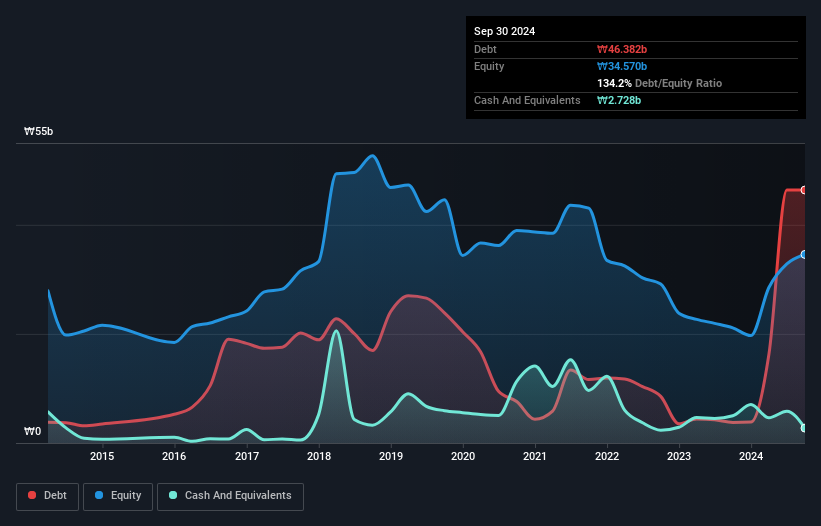The external fund manager backed by Berkshire Hathaway's Charlie Munger, Li Lu, makes no bones about it when he says 'The biggest investment risk is not the volatility of prices, but whether you will suffer a permanent loss of capital.' So it might be obvious that you need to consider debt, when you think about how risky any given stock is, because too much debt can sink a company. We can see that BYON Co., Ltd. (KOSDAQ:032980) does use debt in its business. But should shareholders be worried about its use of debt?
Why Does Debt Bring Risk?
Debt and other liabilities become risky for a business when it cannot easily fulfill those obligations, either with free cash flow or by raising capital at an attractive price. Part and parcel of capitalism is the process of 'creative destruction' where failed businesses are mercilessly liquidated by their bankers. However, a more usual (but still expensive) situation is where a company must dilute shareholders at a cheap share price simply to get debt under control. By replacing dilution, though, debt can be an extremely good tool for businesses that need capital to invest in growth at high rates of return. When we think about a company's use of debt, we first look at cash and debt together.
View our latest analysis for BYON
How Much Debt Does BYON Carry?
You can click the graphic below for the historical numbers, but it shows that as of September 2024 BYON had ₩46.4b of debt, an increase on ₩3.78b, over one year. However, it also had ₩2.73b in cash, and so its net debt is ₩43.7b.

How Healthy Is BYON's Balance Sheet?
Zooming in on the latest balance sheet data, we can see that BYON had liabilities of ₩27.3b due within 12 months and liabilities of ₩29.7b due beyond that. Offsetting these obligations, it had cash of ₩2.73b as well as receivables valued at ₩7.68b due within 12 months. So its liabilities total ₩46.6b more than the combination of its cash and short-term receivables.
This deficit casts a shadow over the ₩17.4b company, like a colossus towering over mere mortals. So we'd watch its balance sheet closely, without a doubt. After all, BYON would likely require a major re-capitalisation if it had to pay its creditors today. The balance sheet is clearly the area to focus on when you are analysing debt. But you can't view debt in total isolation; since BYON will need earnings to service that debt. So when considering debt, it's definitely worth looking at the earnings trend. Click here for an interactive snapshot.
In the last year BYON wasn't profitable at an EBIT level, but managed to grow its revenue by 67%, to ₩21b. With any luck the company will be able to grow its way to profitability.
Caveat Emptor
While we can certainly appreciate BYON's revenue growth, its earnings before interest and tax (EBIT) loss is not ideal. Its EBIT loss was a whopping ₩2.4b. If you consider the significant liabilities mentioned above, we are extremely wary of this investment. That said, it is possible that the company will turn its fortunes around. Nevertheless, we would not bet on it given that it vaporized ₩3.2b in cash over the last twelve months, and it doesn't have much by way of liquid assets. So we consider this a high risk stock and we wouldn't be at all surprised if the company asks shareholders for money before long. When analysing debt levels, the balance sheet is the obvious place to start. However, not all investment risk resides within the balance sheet - far from it. These risks can be hard to spot. Every company has them, and we've spotted 2 warning signs for BYON (of which 1 is potentially serious!) you should know about.
Of course, if you're the type of investor who prefers buying stocks without the burden of debt, then don't hesitate to discover our exclusive list of net cash growth stocks, today.
Valuation is complex, but we're here to simplify it.
Discover if BYON might be undervalued or overvalued with our detailed analysis, featuring fair value estimates, potential risks, dividends, insider trades, and its financial condition.
Access Free AnalysisHave feedback on this article? Concerned about the content? Get in touch with us directly. Alternatively, email editorial-team (at) simplywallst.com.
This article by Simply Wall St is general in nature. We provide commentary based on historical data and analyst forecasts only using an unbiased methodology and our articles are not intended to be financial advice. It does not constitute a recommendation to buy or sell any stock, and does not take account of your objectives, or your financial situation. We aim to bring you long-term focused analysis driven by fundamental data. Note that our analysis may not factor in the latest price-sensitive company announcements or qualitative material. Simply Wall St has no position in any stocks mentioned.
About KOSDAQ:A032980
BYON
Manufactures and sells industrial chemicals in South Korea and internationally.
Slightly overvalued with imperfect balance sheet.
Market Insights
Community Narratives




